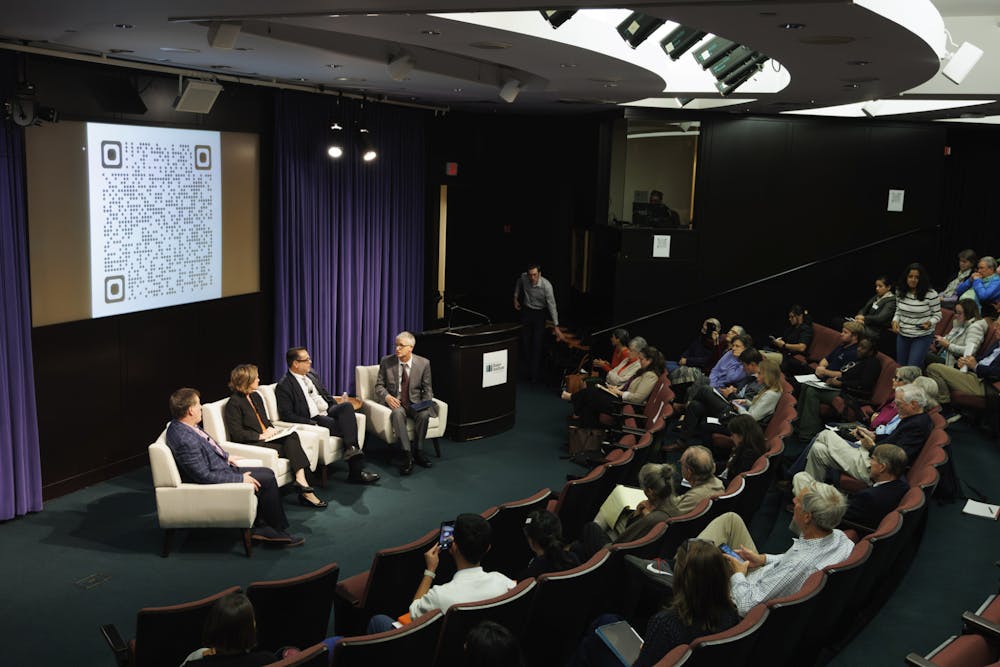Vaccine policy conference takes a shot at public health

The 2024 Baker Institute Vaccine Policy Symposium convened Nov. 15, focusing on current vaccine policy research and strategies to combat vaccine skepticism in Texas. Vaccine hesitancy is on the rise, according to the Centers for Disease Control and Prevention, with a growing number of measles cases driven by declining vaccination rates among Americans.
This event was the second Vaccine Policy Symposium, with the first being held in fall 2022.
Kirstin Matthews, a fellow in science and technology policy at the Baker Institute, said that the event was intended to encourage engagement with vaccine policy.
“Previously, we conducted research and released it,” Matthews wrote in an email to the Thresher. “But we wanted to come together with others interested in vaccine policy to discuss the research instead of just publishing it. We also noticed that many of the people you would think would promote vaccine policies were no longer doing so, such as doctors and medical schools. This was our effort to draw attention to this important issue.”
Matthews opened the symposium by presenting her research on the voting patterns of legislators from Texas, Arkansas, Louisiana and Oklahoma who had health or biology backgrounds.
“Out of the more than 600 legislators, we found 33 that actually were having a biology background … what shocked us was that there were only nine of these legislators that we scored positively for voting for vaccine bills,” Matthews said in her speech. “Several health legislators from Texas, specifically, actually sponsored or co-signed bills that restricted access to vaccines.”
Ann Johnson, state representative for District 134 — which includes Rice — discussed the politicization of vaccine policy, drawing from her experience as a lawmaker.
“I am worried that we are getting to a point in politics where party is superseding the interest of public health and our medical community,” Johnson said in her speech. “Vaccine disinformation and misinformation is almost completely partisan … So much so that even scientific physicians who have been elected to state house and state senate positions will dismiss and disregard and walk away from their medical training and science and profession.”
Experts on the panel differed on possible solutions for addressing vaccine hesitancy. Saad Omer, dean of the Peter O’Donnell Jr. School of Public Health at the University of Texas Southwestern Medical Center, said building trust in healthcare providers was a potential solution.
“I’ve been pushing for the most trusted source of vaccine information, which is healthcare providers,” Omer said, referring to a study where he analyzed vaccine hesitancy in low and middle-income countries.
Michael Emerson, the Baker Institute’s Harry and Hazel Chavanne Fellow in Religion and Public Policy, said it was important to promote vaccines among prominent church leaders and influencers, as opposed to relying on healthcare providers. Emerson’s research focused on vaccine hesitancy in white evangelical communities.
“When we did the vaccines for Covid and tried to get people interested in taking them … we would have doctors and lab coats … that doesn’t work,” Emerson said in his speech. “What works in [evangelical] communities like this is you would have religious leaders saying, ‘We need the vaccine’, you would have Christian recording artists saying, ‘We need the vaccine’, you would have even have country singers saying, ‘We need the vaccine’. Those are the groups that this group will look up to and trust, not medical doctors, not government officials.”
Similarly, Johnson said inequitable access to healthcare made it difficult to rely on healthcare providers to remedy vaccine hesitancy in Texas.
“Remember that we have the highest rate of uninsured children in the nation,” Johnson said. “We do not have Medicaid expansion. So when you say your primary care physician is your most trusted source on vaccination, remember, most Texans don’t have one.”
Johnson highlighted the disparity between vaccine supporters and opponents in terms of political engagement.
“These [anti-vaxxers] are the folks that show up,” Johnson said. “I can’t tell you how they have the financial ability to park themselves in the Capitol on a daily basis to be there, but they do, and they are engaged … The problem is, there’s only one segment of voices that are really getting heard.”
More from The Rice Thresher

Rice welcomes 7.8% of applicants to class of 2029
Rice accepted 2,852 applicants to the class of 2029 March 26, said Yvonne Romero, vice president for enrollment. This represents 7.8% of 36,777, the highest acceptance rate since 2022.

Engineering school celebrates 50th anniversary, invites students, alumni and speakers
The George R. Brown School of Engineering invited engineering alumni, students and faculty to celebrate its 50th anniversary March 28-29. The event, which took place in the Engineering Quad, included speakers, a drone show, alumni gatherings and other social events like mixers.
Student store offers discounted merch to students
Select merchandise from the Campus Bookstore will now be available to students for a discounted price, according to an Instagram post by the Student Association in collaboration with the Campus Bookstore. Each month, designated “spirit items” will be offered at a 10% discount. For the month of March, the selected merchandise was two blue Rice T-shirts.


Please note All comments are eligible for publication by The Rice Thresher.